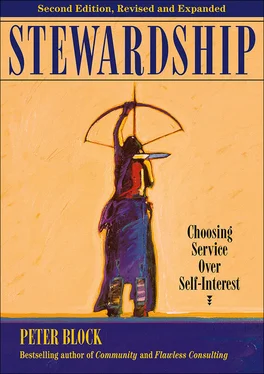We have developed many other practices over the years to support a partnering relationship with authors, including launching each new book with an “Author Day” that allows authors to interact with our entire staff and to work directly with our editorial, design and production, sales and marketing, and digital community building teams; supporting the growth of the “BK Authors Cooperative,” which is an independent organization through which BK authors help each other in numerous ways to increase their success and impact; and creating a groundbreaking “Bill of Rights and Responsibilities for BK Authors.” These partnering practices and many others are major contributors to Berrett-Koehler’s success and are why many view BK as one of the most author-friendly publishers.
We approach relationships with other stakeholder groups with a similar partnering approach. This starts with the ownership of our company by our employees, authors, customers, suppliers, service providers, sales partners, and other stakeholders. All these groups are included in our strategic planning processes and our occasional “BK Community Dialogues.” And our board of directors includes representatives of all these groups. This has led to great support for Berrett-Koehler by our stakeholders throughout our company’s history, including during challenging economic times.
So we at Berrett-Koehler know from abundant firsthand experience that the ideas in Stewardship are powerful and effective in creating meaning, contribution, and success for an organization or community.
It is my hope that every leader, every aspiring leader, every change agent in any group, and every member of the BK community will read this book. I know that all who do so and who seek to incorporate these concepts in their life and work will be richly blessed and increase their capacity to do good in the world.
Steven Piersanti President, Berrett-Koehler Publishers
O UR TASK IS TO create organizations that work, especially in a world where everything constantly seems up in the air. We know that fundamental change is required. We keep talking about cultural change, but this will not be enough if we stay focused on changing attitudes and skills. No question that beliefs and attitudes need to change, but unless there is also a shift in governance – namely, how we distribute power and privilege and the control of money – the efforts will be more cosmetic than enduring.
The need for something different partly grows out of us as individuals. There resides in each of us the desire to more fully integrate our lives. We must feel fragmented, because we talk about ourselves as if we were cats with several lives. “This is my work life,” “This is my personal life,” “This is my spiritual life.” In compartmentalizing our lives, we are constantly setting aside parts of ourselves, even at times giving ourselves away. This fragmentation is also reflected in our organizations. There are all the debates between being people oriented and task oriented, hard-nosed and soft-nosed, values driven and results driven.
The central idea of this book, stewardship, has the potential for us to reintegrate parts of ourselves and move beyond the debates in our organizations. In this way, it is a book of reconciliation. Stewardship focuses our attention on aspects of our workplaces that have been most difficult to change: the distribution of power, purpose, and rewards. It is these dimensions of organizations that need to be re-formed if we are to become whole in our efforts to strengthen ourselves. We are each engaged in discrete exercises to help our organizations lose weight, become more flexible, and stay hopeful. We have a program for everything. Cost reduction, continuous improvement, customer service, cycle time, empowerment. Each one seems to meet its goals, yet a major part of our lives stays unchanged. We remain watchful of people who have power over us; we feel that the organization is the creation of someone other than ourselves and that the changes we want to make still need sponsorship and permission from others at a higher level.
We need a way of reconciling the promise of our programs with the experience of our day-to-day lives so that the Queen Mary truly changes direction.
Stewardship is the umbrella idea that promises the means of achieving fundamental change in the way we govern our institutions. Stewardship is to hold something in trust for another. Historically, stewardship was a means to protect a kingdom while those rightfully in charge were away, or, more often, to govern for the sake of an underage king. The underage king for us is the next generation. We choose service over self-interest most powerfully when we build the capacity of the next generation to govern themselves.
Stewardship is defined in this book as the choice to preside over the orderly distribution of power. This means giving people at the bottom and the boundaries of the organization choice over how to serve a customer, a citizen, a community. It is the willingness to be accountable for the well-being of the larger organization by operating in service, rather than in control, of those around us. Stated simply, it is accountability without control or compliance.
The underlying value is about deepening our commitment to service. We have the language of service. We serve our country; we call ourselves a service economy; we choose public service as a profession; we have committed to serve customers. What is missing is the experience of service. Our experience is too often to find ourselves surrounded by self-interest, especially inside our institutions. The ways we govern, manage, and lead are a testimony to self-interest. Authentic service is experienced when these conditions exist:
• There is a balance of power. People need to act on their own choices. Acts of compliance do not serve those around us or the larger organization. Dominance also fails. We do a disservice to others when we make decisions for them. Even if we are right.
• The primary commitment is to the larger community. Focusing constant attention on the individual or a small team breeds self-centeredness and entitlement.
• Each person joins in defining purpose and deciding what kind of culture this organization will become. We diminish others when we define purpose and meaning for them, even if they ask us to do so.
• There is a balanced and equitable distribution of rewards. Every level of an organization shares in creating its wealth and expanding its resources. When an organization succeeds in its marketplace, money and privilege need to be more evenly distributed among levels if our commitment to service is to have any integrity.
Without these elements, no genuine service is performed.
These notions of service and stewardship, however, are not the basis of how we currently run our organizations. They do reflect some of our intentions about how to govern, but not the reality.
Some of the elements are often in place. We frequently see innovative pay systems, self-managing teams, total quality efforts, partnerships, customer attentiveness, and inverted pyramids. They are rarely, however, put together in a pervasive governance strategy. As a result, we end up too often working against ourselves. We share control with the left hand and take it back with the right. One moment we are on the fast track toward participation, and the next moment we are instituting more controls. The new technology makes it even easier to control workers. We can electronically track their movements, their work patterns, who they are communicating with, how much they are working even when they are out of sight. Supervision has almost turned into surveillance.
Читать дальше












